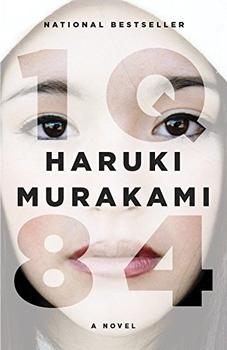Summary | Excerpt | Reviews | Beyond the book | Read-Alikes | Genres & Themes | Author Bio

Winner of Japan's 2009 Ōe Prize (an award for literary novels judged by Nobel laureate Kenzaburō Ōe), Nakamura's English-language debut chronicles the aftermath of a "perfect crime" in which the titular thief plays a small role. It also delineates the time leading up to and after the moment when the crime's mastermind ensnares him with another three jobs.
Using this spare plot as its basis, Nakamura deftly creates the tale of a Tokyo pickpocket while exploring questions of fate and manipulation. Here, the underworld bears little trace of the glamor that sometimes occurs in works featuring an anti-hero. As this criminal world consumes its members along with its victims, readers are treated to an empathetic portrayal of a man whose desire for life resurfaces under duress.
The thief - whose name is revealed once in a quick aside - robs only the rich, without violence; keeps only the cash; returns the wallets he steals; and helps others - notably a young boy whose mother, a member of the demimonde, has ordered him to shoplift. He appears as a talented but non-threatening everyman whose principles guide his actions. Though the thefts are not ingenious in their execution, they demonstrate the character's ease at gliding through public spaces, the realistic lack of self-awareness of his fellow travelers, and the extent to which he depends on anonymity. It's a lifestyle that proves unsustainable, yet difficult to change when deep entanglement with mysterious elements complicates his escape.
Some of these elements include a recurrent, ominous image of a tower; memories of his past relationship with a woman named Saeko; and Kizaki, the leader of a gang the thief was briefly involved with, who later manipulates the thief simply because he can. In addition, the deaths of several prominent figures have been made possible by the thief's participation in a home invasion, a crime which Kizaki uses to cover up more sinister acts.
Although the minimal background to these events may puzzle some readers, such ambiguity is arguably necessary in a novel that hinges on a detached and unreliable narrator. Shadowy memories and circumstances embody themes of loss and emotional deadening, which arise from existing on the fringes. The thief, who has long made it a practice to operate alone, must struggle with the insistent reminder that it is impossible to separate past from present and to suppress the need for human connection.
Despite its darkness (at one point, in a moment of reflection, the thief declares, "If you can't stop the light from shining in your eyes, it's best to head back down in the opposite direction"), Nakamura imbues the tale with occasional humor as well as interludes that reveal the main character to be less hardened than he seems. The result is a disturbing examination of self-denial, bravado and its consequences, with an impressively rendered twist: the thief becomes a vulnerable - even winning - figure.
![]() This review was originally published in The BookBrowse Review in April 2012, and has been updated for the
January 2013 edition.
Click here to go to this issue.
This review was originally published in The BookBrowse Review in April 2012, and has been updated for the
January 2013 edition.
Click here to go to this issue.

If you liked The Thief, try these:

by Akira Otani, Sam Bett
Published 2025
A fierce mixed-race fighter develops a powerful attachment to the yakuza princess she's been forced to protect in this explosive queer thriller: Kill Bill meets The Handmaiden meets Thelma and Louise.

by Haruki Murakami
Published 2013
A love story, a mystery, a fantasy, a novel of self-discovery, a dystopia to rival George Orwell's - 1Q84 is Haruki Murakami's most ambitious undertaking yet.
Your guide toexceptional books
BookBrowse seeks out and recommends the best in contemporary fiction and nonfiction—books that not only engage and entertain but also deepen our understanding of ourselves and the world around us.